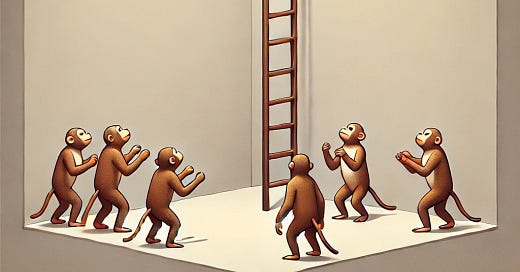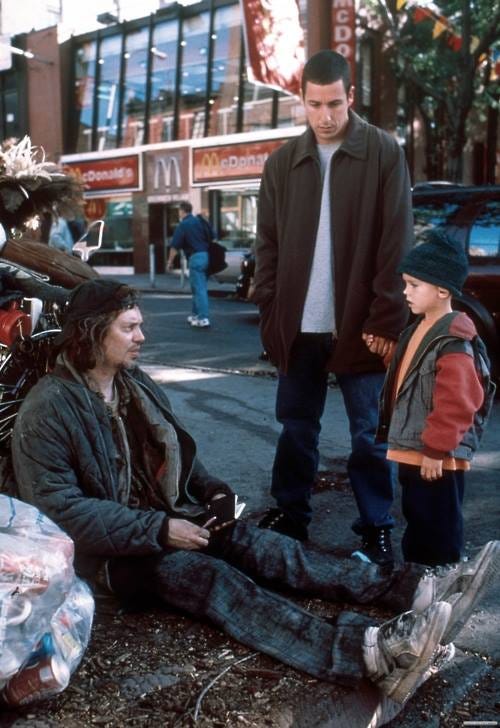Fear Based Management
It's hard to identify and quantify positive motivators for teams, but it's easy to see where fear comes up short.
Many of us have worked for them - organizations where the driving motivator of most of the workers isn’t a mission statement or a set of values or a belief in the work, but plain old fear. Some might argue it’s effective, and there are examples of fear working in the short term, but as a long term, sustainable management principle it is worthless.
People who work in fear-based environments will always revert to the mean of CYA - cover your ass. CYA initiatives don’t lead to good work; they lead to shortcuts, doing the bare minimum to avoid some kind of threatened punishment, and they require brain space that should be used for good work product and innovation. They are the antithesis of what solid work is, and they are unfortunately too prevalent today.
The Banana on Top of the Ladder
There’s an old experiment in which five monkeys are placed into a room, the center of which contains a banana on a string hanging above a ladder. Once the monkeys get acclimated to the room, they realize they can reach the banana by climbing the ladder, so one of the monkeys does just that.
Except when the monkey starts to ascend, all of the monkeys still on the ground are sprayed with cold water. This causes the monkeys to grab the relatively entrepreneurial monkey off of said ladder. Whenever a monkey tries to go up the ladder, the rest of them get sprayed with water, causing them to remove the monkey from the ladder to avoid the soaking.
Eventually the monkeys don’t need the water to devolve into groupthink: they grab any monkey trying to get the banana at the top of the ladder. To add an extra twist, the experimenters swap a monkey out. This new monkey has no recollection of the water, which has already stopped being doused on them and is simply a threat at this point, so he climbs up the ladder to get the banana. He’s quickly - and violently - prevented from doing that.
The experimenters begin swapping out the monkeys one-by-one until the five monkeys are all there having no personal recollection of being sprayed with water; they just know to beat the enterprising monkey trying to get the delicious fruit.
The business lesson is obvious (painfully so, and we’ll get into why later): organizational efficiency is decimated by the attitude of “Because that’s how it’s always been done.” This newsletter goes one step further in that this attitude cannot be so engrained in a workforce without a healthy level of fear - in the monkeys’ case, the threat of being sprayed with cold water, leading to transitive primate violence.
The Story is Fabricated - The Lesson Not So Much
The experiment never happened. And this is particularly disappointing to me as I was researching this edition of the newsletter as the author has been known to parrot the findings of this under the guise of a real scientific basis.
And not because I enjoy monkeys beating the crap out of each other; it more comes from the desire to see the group mentality reinforced by fear be scientifically sound. But the fact that it is bandied about not as an allegory but a true experiment by various publications shows that it has struck a chord.
I’ve seen plenty of organizations in which this story would 100% be true. In fact, the Wall Street Journal had an article recently on overwork in the finance space that has tragically led to employee deaths in which the only explanation for why people would be subject to this is a) that’s how it’s always been done and b) a culture of fear that permeates junior bankers getting barked at by their MDs (as proven by the “pls fix and do NOT put it in the system specifically designed to prevent this kind of abuse” examples in the article.)
And because those MDs were once juniors who were once also abused in this way, for them it’s simply always the way it’s been done. There’s no justification for it - research shows how unproductive humans become after overwork, so pushing them into the realm in which it would be fatal had to be producing substandard work product. And the junior bankers did it because they were simply scared to be chewed out by their superiors. You don’t need the monkey experiment for proof when late stage capitalism is this cruel.
Break the Cycle
Whenever I join a new team or consult on a new or broken process there are a few things that I do as a matter of course, and the foundational one is ask “Why?” at nearly every step of the way. I do it to the point where people get annoyed (it really engenders me to a team.)
The more defensive people get at the question, the more obvious it is they’re not happy with the reason and are externalizing that. And if they’re on a fear-based team, they are scared of admitting they don’t know why something is done, further illuminating the motivation behind the process and highlighting the exact reason we’re having the conversation.
Drilling down into the reason for a particular process or action at work is key to driving operational efficiency. We don’t need humans to do a process without understanding why - that’s what machines are for. And given the pace at which AI is expanding, the humans simply doing rote routines at work with no actual justification for it are at the highest risk of being replaced by a machine.
The answer “Because that’s the way it’s always been done” is borderline offensive in how lazy it is. If a team member is doing that, they need to be told to try to find a better way to do it and, if they can’t, then at least they now have the justification for why it’s a part of the process.
Zero Based Processing
You’ve probably heard of zero based budgeting - or at least its cool ZBB acronym. This is where a department’s budget does not roll over year over year, but starts at zero every year for the planning process and rises to the level of need and justification for which a department head needs it. The same nerds that came up with the TI-86 calculator came up with this strategy, and if it was good enough for Jimmy Peanuts, it might be good for you.
Processing should have a zero based renew period, where an established process is theoretically thrown out the window and all departments involved in it start from scratch. This removes existing patches and exposes the larger, institutional problems afoot in an organization because it forces people to honestly answer the question of “Why?” for each step.
This can’t be a quarterly exercise, and even yearly might strain existing resources. And it needs to be done by those in the trenches with this stuff - an outside consultant will simply tell you what to do and cash your check, without taking into account existing roadblocks and potential political minefields.
It may not result in a brand new process immediately, but having exposed the weak links in it the team can get to work removing those obstacles in the background outside of their day-to-day. I’ve seen this successfully applied to things like analytics dashboards, deck creation processes, and QA processes. And I know those examples are just microcosms of where this could be applied.
Remove the Fear
One aspect of all of this that doesn’t require a workshop is the removal of fear from an organization. Look out for the key indicators of fear-based management: high turnover (no one wants to work for a fear monger), high burnout (those forced to work for a fear monger will suffer), alignment in meetings that falls apart individually (people scared to ask questions or admit an unknown in a meeting who hope to figure it out later without anyone knowing). These all sound familiar to chaos and that’s because chaos tends to be a symptom of a fear-based team.
If you’re scared to bring up improvements or suggestions to your boss, you probably already know you’re in a fear-based organization. It might very well be time to find a place where the monkeys hold the ladder for you as you reach for the banana instead of beating you for having the ambition to do it.
Grab Bag Sections
WTF Amplemarket: If you work at an agency and have a LinkedIn profile, chances are you get a lot of cold emails and cold calls from salespeople. It’s annoying, but it’s also a part of their job and you miss 100% of the shots you don’t take, so I get it.
As a rule, I never give out my personal cell for business (I rarely give it out for personal reasons.) Yet somehow at least once a week I’m cold called by someone who had no way to legitimately get my cell.
A friend had this happen to them recently (I won’t out them and embarrass them as a reader of this newsletter) and he pressed the salesperson as to how they got his number. They told him about Amplemarket.
Amplemarket is the latest “AI” based company helping to drive cold calls right to your cell. They have a product that helps triangulate a bunch of different data sources to essentially create a device graph to connect things like social media profiles with emails and phone numbers. So even if you’re not giving out that information, they’re able to connect it to then sell to cold callers who will randomly ring you at the most inopportune times.
Again, I don’t hate the player - you gotta hit those quarterly numbers. I just hate the game. I very rarely do business with cold callers (I cannot remember the last time a cold call to me resulted in business for the cold caller - it may simply be never), but I am certain that I never have (and likely never will) do business with folks who call my cell.
So if you see my name pop up on your Amplemarket list as a prospect, save yourself the time and annoyance of calling me and move on to the next person on your list.
Album of the Week: It’s the last week of meteorological summer and the single “California Dreaming” off of the Mama’s and the Papa’s’ album If You Can Believe Your Eyes and Ears is a good segue into fall. Though if you live in New York you know we’ve gone from having four seasons to simply two - summer and winter with maybe a week of spring and fall in between.
The album is excellent. “Monday, Monday” is way too upbeat for a song about the worst day of the week, but still good. “In Crowd” is a great cover of that song. And this newsletter being brutally honest, “Straight Shooter” is quality music, even if it’s very likely about drugs.
But what is incredible about the band is that they rival Fleetwood Mac for a group beset by infighting but that left an indelible mark on the culture. John Phillips was one of the organizers of one of the best music festivals of all time in Monterey Pop and sired one third of Wilson Phillips (the other two thirds having no less than Brian Wilson as a father.) He also was a serial cheater, started an extra-martial affair with Michelle Phillips when she was a teenager, and was an addict and unrepentant drunk who continued drinking even after receiving a liver transplant.
While John was the most troubled of the group, the disfunction didn’t end with him. Denny Doherty and John’s wife Michelle Phillips began an affair while in the band, even though Cass Elliot was madly in love with Doherty. Elliot even asked Philips “'I don't get it. You could have any man you want. Why would you take mine?” It led to Phillips being kicked out of the band, but asked back later when a proper replacement could not be found.
And poor Cass Elliot. Another victim of addiction, she blew her big chance of shedding the Mama Cass label she disliked so much when her heroin habit led to embarrassingly bad opening night performances at Caesar’s Palace in Vegas. She had to crawl her way back to the top and was more or less there when she died of a heart attack in London (in a bit of morbid trivia, Cass died in the same room in which Keith Moon passed away four years later.) In a final cruel twist of fate, her manager put out the false rumor that she died choking on a ham sandwich, thinking it would be preferable to people thinking she died due to drug-related causes. As part of a tragic but brilliant band, Elliot may have been the most tragic and brilliant of the bunch.
Quote of the Week: “The real question is not whether machines think but whether men do.” - B.F. Skinner
See you next week!










